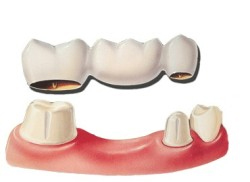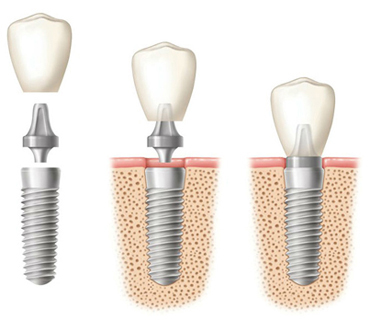What happens when you lose an adult tooth? More and more people get dental implants every year because they are much more stable than other methods of replacing teeth. Getting implants is as close as you can get to having your natural teeth back.
What Are My Options for Replacing Missing Teeth?
 In the past, dentists routinely used crowns and bridges to replace missing teeth. Dental crowns are made by grinding down the top of a damaged tooth and bonding a porcelain cap to it. A bridge (as you can see from the drawing to the left) uses two crowns on either side of the gap to hold a suspended false tooth.
In the past, dentists routinely used crowns and bridges to replace missing teeth. Dental crowns are made by grinding down the top of a damaged tooth and bonding a porcelain cap to it. A bridge (as you can see from the drawing to the left) uses two crowns on either side of the gap to hold a suspended false tooth.

A dental implant is different because it doesn’t rely on the adjacent teeth for its support. It consists of a titanium fixture that replaces the tooth root and fits securely into the jaw. A crown is then attached to it. Because of this, it will look and feel more like your natural tooth. Therefore, it is more conservative, not requiring grinding down the adjacent teeth.
If you are missing all your teeth, the best way to replace them is with an implant-retained denture. Click the link to read more about that option. This solves several of the problems associated with removable dentures.
When Should I Get a Dental Implant?
It can be important to replace missing teeth promptly to avoid long-term effects. When your teeth fall out (or are extracted), your body senses the loss and begins to dissolve away the bone that supported that tooth. Over ten or twenty years, if enough teeth are missing, you will experience facial collapse. Dental implants help prevent this.
How Does the Dental Implant Procedure Work?
There are two steps—surgery and prosthesis.
- The fixture, or root form, is set into the bone. It typically takes some healing time before the root form can support a replacement tooth. The length of this integration process depends on the patient’s bone density and can vary from several weeks to several months. Recent technological advancements keep shortening this recovery time.
- Your new tooth is finished when the dentist places a crown on the fixture. The result looks natural and can accommodate your normal eating and teeth cleaning activities. Unlike a bridge, you will not need special flossing tools.
Are There Disadvantages to Dental Implants?
Dental implants are not for everyone. You must be in good oral and general health to tolerate the surgery. Dental implants can require additional visits and may be more expensive than bridges or dentures. We have built a reputation for being mindful and caring when it comes to treatment options. We’ll be sure to explain to you the pros and cons of your various treatment options and fully honor your choices.
Learn about our unique Crown In A Day service.

